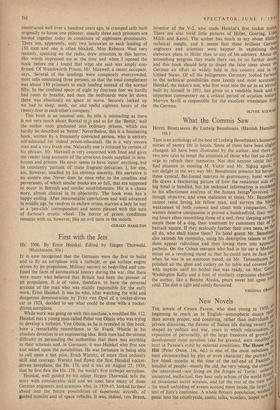What the Commis Saw
;Ito THIS is an anthology of the best of Ludwig Bemelmans's humorolit stories of pantry life in hotels. Some of them have been slight changed, all have been illustrated by the author, and there D 0 two new tales to tempt the attention of those who feel no drastic urge to refresh their memories. Not that anyone could fail t° find pleasure in meeting M. Victor and Mr. Sigsag again, c' not delight in the wry way Mr. Bemelmans presents his heroes-d those cynical, flat-footed martyrs to gastronomy, hotel wait0 He draws a fascinating picture of how the restaurant side of big hotel is handled, but his technical information is incident to his affectionate analysis of the human beingslinvolved. 0 though objective, and even malicious at times, Mr. Bemelluat]; cannot resist loving his fellow man, and surveys the blarair weaknesses of both commis and client with compassion. That waiters deserve compassion is proved a hundredfold, their work. ing hours often resembling those of a serf, their sleeping arrang' ments those of .a dog, their treatment by customers that of tbt barrack square. If they zealously feather their own nests, as tbe', all do, who shall blame them? To hotel guests Mr. Bemolulan'' also extends his sympathy, using his descriptive talents to 014 aria them appear ridiculous and then loving them into appeA , pathetic. On the Cuban marquis who had in his car a Madorill" statue on a revolving stand so that he could turn its face wi when he was in an amorous mood, on Mr. Tannenbaum wb,,,° polished all the glass and cutlery on his table and covered the:. with napkins until his boiled rice was ready, on Mrs. GOT Washington Kelly and a host of similarly capricious charaeteP; the author, like a Bombe Alaska, pours sweet hot upon bitte' cold. The dish is light and subtly flavoured. VIRGINIA a-


































 Previous page
Previous page